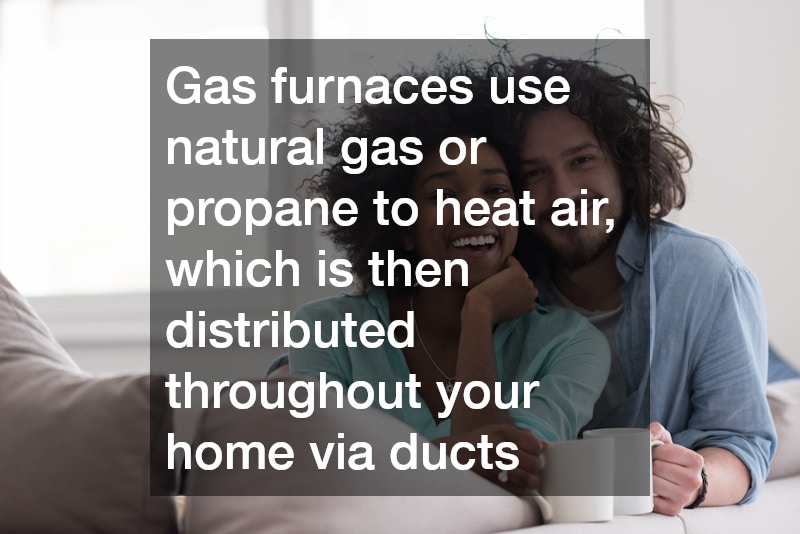When it comes to heating your home, you may wonder whether a gas furnace or a heat pump system is the better option. Both systems have their advantages and disadvantages, and the best choice for your home depends on factors like climate, energy efficiency, cost, and your home’s specific heating needs. Working with a heating and furnace installation company can help you determine which system is right for your home. In this blog, we’ll explore the differences between gas furnaces and heat pumps, comparing their pros and cons to help you make an informed decision.
How Gas Furnaces Work
Gas furnaces use natural gas or propane to heat air, which is then distributed throughout your home via ducts. These systems rely on combustion to generate heat and are particularly effective in colder climates where temperatures frequently drop below freezing. When you work with a heating and furnace installation company, they will help ensure that the furnace is installed properly, maximizing efficiency and safety.
How Heat Pumps Work
A heat pump is a two-in-one system that can both heat and cool your home. Unlike furnaces, heat pumps don’t generate heat through combustion; instead, they transfer heat from one place to another. In heating mode, a heat pump extracts warmth from the outdoor air (even in cold weather) and transfers it indoors. In cooling mode, the process is reversed, similar to how an air conditioner works. Heat pumps are typically powered by electricity and are best suited for milder climates where temperatures don’t often fall below freezing.
Pros and Cons of Gas Furnaces
Pros:
Efficiency in Cold Weather: Gas furnaces are highly effective in regions with freezing temperatures, as they can produce consistent heat regardless of how cold it gets outside. If you live in a northern climate, a gas furnace might be the best option for your home’s heating needs.
Lower Operational Costs in Cold Climates: Since gas furnaces generate heat more efficiently in cold weather, they can be more cost-effective than electric-powered heat pumps in those regions.
Longer Lifespan: Gas furnaces typically have a longer lifespan than heat pumps, with an average of 15 to 20 years.
Cons:
Higher Installation Costs: Installing a gas furnace usually comes with a higher upfront cost, especially if your home doesn’t already have a gas line installed.
Less Energy Efficient: While gas furnaces are powerful, they are generally less energy-efficient than heat pumps, especially in moderate climates.
Carbon Emissions: Gas furnaces rely on fossil fuels, contributing to greenhouse gas emissions. If you’re looking for a more environmentally friendly option, a heat pump may be a better fit.
Pros and Cons of Heat Pumps
Pros:
Energy Efficiency: Heat pumps are highly energy-efficient because they transfer heat rather than generate it. This can lead to lower energy bills, especially in milder climates where they don’t have to work as hard to maintain a comfortable temperature.
Year-Round Use: One of the biggest advantages of heat pumps is that they can be used for both heating and cooling, eliminating the need for a separate air conditioning system.
Environmentally Friendly: Heat pumps use electricity instead of gas, making them a greener option, particularly when paired with renewable energy sources like solar panels.
Cons:
Less Efficient in Cold Climates: Heat pumps struggle to extract heat from the air when temperatures drop below freezing, making them less effective in very cold climates. In these regions, a gas furnace may be a better option.
Higher Electricity Costs: While heat pumps are energy-efficient, they rely on electricity, which may lead to higher operational costs in areas where electricity is expensive.
Shorter Lifespan: Heat pumps generally have a shorter lifespan than gas furnaces, averaging about 10 to 15 years.
Choosing the Right System for Your Home
When deciding between a gas furnace and a heat pump, consider your climate and energy costs. In colder regions, a gas furnace may be more efficient and reliable, while in milder climates, a heat pump can provide year-round comfort with lower energy consumption. Working with a heating and furnace installation company will help you assess your home’s needs and ensure the best system is installed for optimal performance and cost savings.
Conclusion
Both gas furnaces and heat pumps have their strengths and weaknesses, and the right choice depends on factors like climate, energy costs, and your specific heating needs. Consulting with a heating and furnace installation company can help you make an informed decision and ensure your home remains warm and comfortable throughout the year. Whether you choose a gas furnace for its durability in cold weather or a heat pump for its energy efficiency, the right heating system will provide long-term comfort and savings.
.

